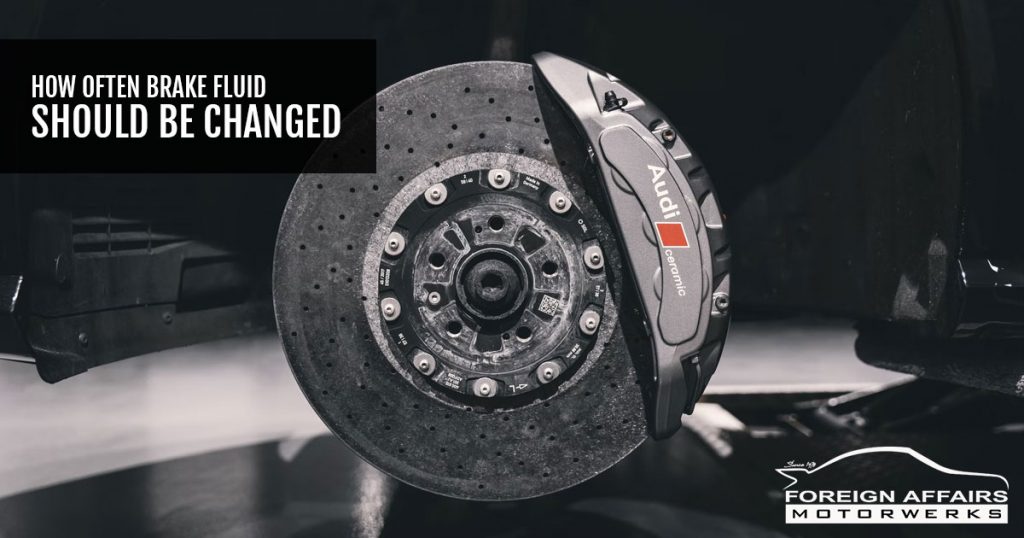How Often Brake Fluid Should Be Changed

53 feet. The distance that it takes the Ferrari F2004 to grind to a halt from 60mph. The Ferrari F2004 is one of the quickest braking Formula One cars on the planet. When it comes to braking performance and safety standards, a few feet can make all the difference. Brake fluid plays an important role when it comes to your brake performance. But how often should you change brake fluid? Here’s a detailed look at brake fluid and why it matters for your safety.
Why Is Brake Fluid Important?
Brake fluid helps to move the parts in your hydraulic brake system. In a nutshell, without brake fluid, your brakes wouldn’t stop your car. When you stomp on your brake pedal, it doesn’t automatically connect to your brake discs and pads. Your pedal acts upon the brake fluid, which in turn engages your brakes. Brake fluid transfers your brake pedal force into pressure. This amplifies the braking force and stops your car.
Brake Fluid Has A Lifespan
Over time, brake fluid performance can deteriorate. This is because brake fluid is hygroscopic, which means that it sucks up moisture. As extra moisture is absorbed, the boiling point of your brake fluid decreases. You don’t want your brake fluid boiling point to decrease, as this increases the likelihood of your brakes overheating. And overheating brakes can lead to brake failure. Just because your brake fluid levels are adequate, doesn’t mean that your brake fluid is at its best quality.
How Often Should I Change My Brake Fluid?
This differs according to the car that you drive, as well as driving style and driving conditions. But there are some general guidelines when it comes to brake fluid changes. A safe rule of thumb is to change your brake fluid every 2 years or 20,000 miles. This will prevent you from experiencing any braking issues. Some car manufacturers recommend a more relaxed time frame for fluid changes.
It’s best to speak to your trusted mechanic about when you should change your brake fluid. A reputable service facility will offer tailor-made routine maintenance schedules. These will ensure that you never miss a brake fluid change. Or any other car maintenance requirement for that matter. If you suspect that it’s time for a brake fluid change, don’t delay. Brake moisture can cause corrosion damage to your calipers, master cylinders, and brake lines.
Signs That’s Your Brake Fluid Needs Changed
Here are the five telltale signs that you may be in for a brake fluid change. Hoping to break onto the Palm Beach International Raceway league one day? It all begins by knowing the ins and outs of your car. And being able to identify the warning signs.
ABS Light Coming On
Your Anti-lock Braking system light is a clear warning that something is up with your brakes. This warning light often signals an issue with your brake fluid. If you see it on, you should either top up or replace your brake fluid. Be careful not to keep topping up your brake fluid without replacing it. This could mean that older, degraded fluid may still be present in your braking system.
Strange Noises
Low brake fluid levels are sure to cause some strange noises in your brakes. If you hear any unfamiliar sound, it’s best to get your brake fluid checked out immediately.
Pedal Problems
You should never have to push your brake pedal down too hard. This could signal a brake fluid shortage. If your brake pedal feels ‘softer’ than usual, get your brakes checked out.
Burning Smell
Brakes should never make a burning smell. If you smell burning while braking, it could mean that your clutch or your brakes are overheating. If you smell burning, pull over immediately and give your brakes a chance to cool down. You’ll want to contact your trusted brake mechanic as soon as possible.
Brake Pads Not Functioning Well
The last warning sign is malfunctioning brake pads. If you hear any squealing, grinding, or squeaking noises, then it’s time to check out your brake fluid.
Brake Fluid Specialists in Pompano Beach
At Foreign Affairs Motorwerks, we have the latest brake diagnostic equipment. If you suspect a brake fluid issue, our team of technicians will diagnose the problem quickly. And hey, although we may not get your stopping distance down to the Ferrari F2004, we’ll get it as close as possible. Give our friendly team a call today at 954-746-0488. You can find Foreign Affairs Motorwerks on Facebook for the latest online updates.



